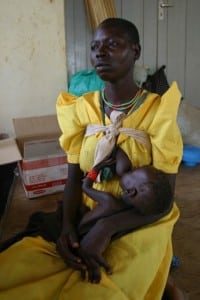
In 1990, Millennium Developmental Goals were created on an international scale. One of their priorities was to reduce the infant mortality rate by two-thirds in every country. Unfortunately, infant death rate in South Africa since then. According to nutrition specialist Chantell Witten, this is largely due to the fact that most infants in South Africa are formula fed. She recently shared her thoughts on this with the United Nations.
Even for countries where infant death is uncommon, infant formula is considered to be a poor substitute for breast milk since it lacks the natural antibodies produced within a mother’s milk. But in these countries, the result is rarely fatal and few parents ever even know the difference, save maybe some extra issues with gas, bloating, constipation or mild infections. In third world, however, the substitution can prove to be a fatal one.
Mixed with contaminated water, infants can become infected with parasites. The infection can lead to severe diarrhea. This, in turn, can lead to dehydration, and ultimately, death. Pneumonia and other water-borne illnesses are also a risk for young infants. And, because the infants are not receiving the much-needed antibodies from their mothers, they are less able to ward off the infection from contaminants in local water sources.
In an effort to turn things around, policies regarding breastfeeding recommendations and free formula distribution are expected to change. Unless special medical conditions exist, free formula will not be provided and women will be encouraged to breastfeed their infants exclusively for the first six months of life.
In one province, KwaZulu Natal, infant nutrition has already changed. Mothers are advised to breastfeed exclusively for six months, per the worldwide recommendation from the World Health Organization. Changing policies country-wide, however, may prove to be more difficult and critics are concerned that the policy will be both difficult and dangerous to implement.
Currently, only 8 percent of all mothers in South Africa breastfeed their infants. Making a mass change such as this may floor the needs of infants already being formula fed. Additionally, antiretroviral drugs are needed to help decrease the probability of HIV transmission from mother to baby.
Haroon Saloojee, community pediatrics advisor at the University of Witwatersrand, warned that “the likely scenario is that clinics don’t have the nevirapine [antiretroviral drug] and mothers will not be able to give their babies their medication and will continue to breastfeed. The situation in the health service currently makes that a high-risk probability.”
The World Health Organization says, however, that statements and concerns such as these seem to ignore global data – data that has indicated that mothers are adhering to their drug regimens, bringing mother-to-child transmissions down to just under five percent.
Related Articles:
- Hospitals Being Pressured to Stop All Formula Samples to New Parents
- Mother Sentenced to Six Years in Prison after Infant Son Dies from Meth Exposure
- Breastfeeding for Six Months – Idealism vs. Realism






